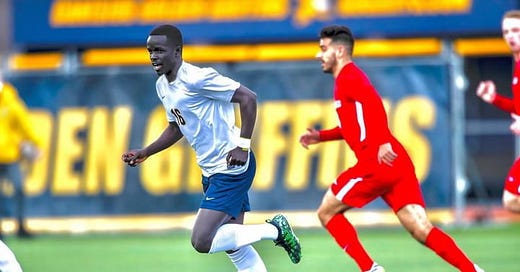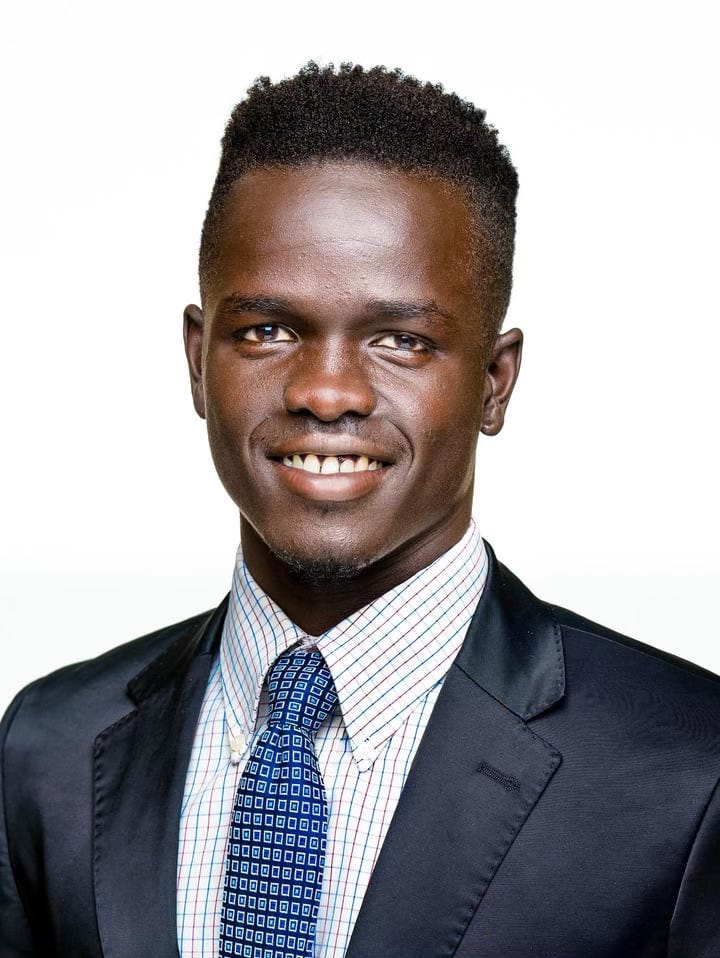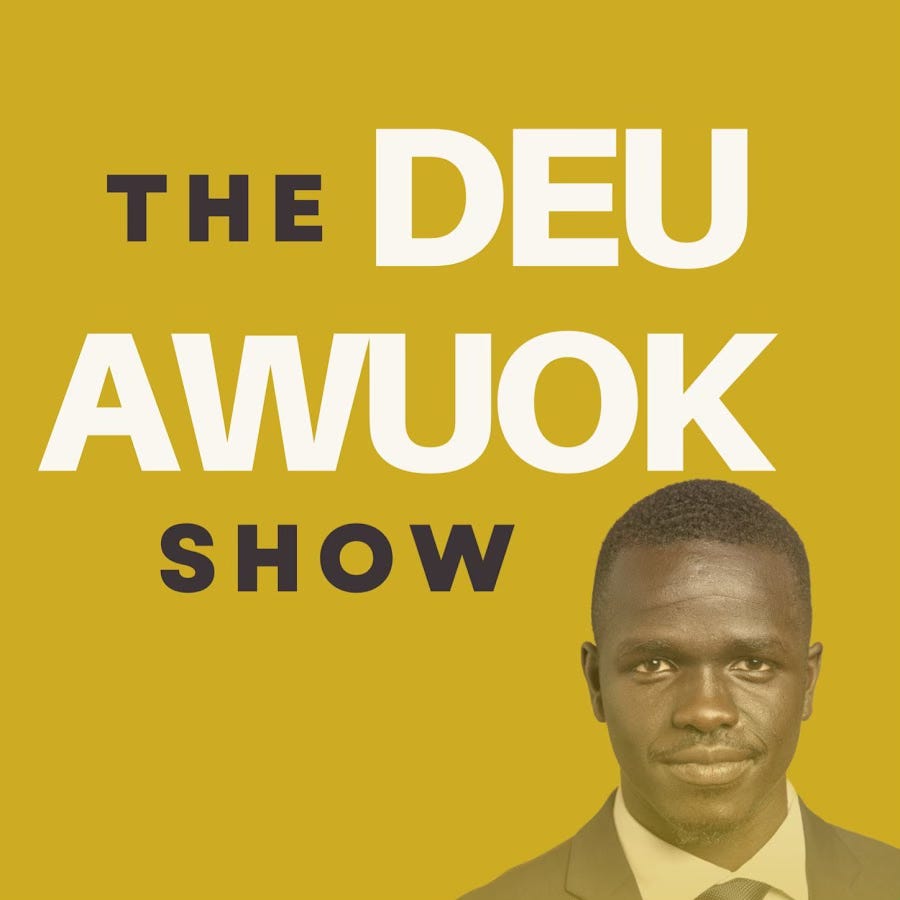‘Hi , My name is Deu Awuok and I am a former DI college athlete from South Sudan.’
What initially drew you to soccer, and how did it shape your early life and career aspirations?
‘I started playing soccer relatively late around the age of 12/13 after my family moved to the U.S. I used to go to this afterschool program for refugee students and many of the kids there played soccer. Most of the kids had just moved to the U.S and didn’t speak English but everyone was able to bond over the beautiful game of soccer despite the language barrier. I began playing soccer as a way to make new friends and assimilate into the new country. I quickly fell in love with the sport and have been playing ever since then. After a few years of playing and seeing a drastic improvement, I decided that I wanted to play D1 college soccer with aspirations of going on to play it professionally. I got to meet and interact with amazing people from many different walks of life while playing soccer and have learned numerous important life lessons with the ball at my feet.’
Can you share a specific moment in your soccer career that had a lasting impact on you, either positively or negatively?
The struggles I had with adjusting to college soccer and the resulting lack of self-confidence is something that has had a tremendous impact on me. Going through that was extremely tough mentally but I have been able to reflect and learn life lessons from that experience. While not an ideal experience, I am thankful for the lessons learned.
What were the biggest emotional challenges you faced when you decided to leave soccer and not pursue it professionally?
I decided to stop pursuing the professional soccer route after my freshman year of college soccer. I frankly was not as good as I thought I was and I was struggling with confidence. My thought process at the time was that even if I got over the confidence issue and was able to play to my full potential, the best outcome for me would be the 3rd tier (possibly 2nd tier) of professional soccer in the U.S. The pay at that level was not worth the work required to get there and that’s assuming everything goes perfectly. I also wanted to be in a position to help my family financially and I couldn’t do that if I wanted to pursue the professional soccer route. The risk-return analysis of trying to pursue professional soccer was not attractive enough and I decided to focus on trying to break into Wall Street instead.
The Transition
Athletes often struggle with uncertainty when shifting to a non-sports career. How did you cope with leaving the familiar environment of sports for the unknown territory of private equity?
I started my career in Investment Banking (IB) before I moved into Private Equity. What drew me into the industry and made that transition easier was the similarities between IB and what I was used to while playing soccer; understanding the importance of teamwork and communication, team hierarchies/dynamics, being able to compete with other teams (banks) to win mandates, and working alongside very driven and ambitious folks who you can learn from. The various similarities were helpful and I was also fortunate to have known early on in my college journey what I wanted to do and that allowed me to prepare for the role. I then pivoted to Private Equity after a few years of Investment Banking.
Was there a particular event or realization that made this decision clear?
I stumbled across the field of investment banking after my freshman year of college and that led me to private equity. Because I would miss classes while traveling for soccer games, I found myself in the tutoring center to get caught up on materials that I had missed during class. My stats tutor just happened to be a double major in Finance and Economics like myself and so I asked him what he was looking to do with his degrees and he was actually in the middle of recruiting for an Investment Banking internship. After hearing how intense and competitive the recruiting process was, I did some research later that night and quickly came to the conclusion that it was something that I wanted to pursue. It felt like the perfect match, I would be working in a role that combined both of my interests in corporate finance and macroeconomics, working in a team environment, and working alongside some very smart and driven people. The opportunity to get exposure to the senior management teams of large corporations as a recent college graduate was also enticing. I went back to that tutor (shout out to Justin Begley) and told him that I also wanted to break into wall street. Justin became a mentor for me and provided me with guidance/resources to help me break into Investment Banking.
Many athletes define themselves by their sport. How did you manage the psychological shift from being a soccer player to becoming a professional in private equity? What strategies did you use to redefine your identity?
I had a mini identity crisis after my freshman year of college as I struggled with adjusting to D1 college soccer and the ensuing lack of self confidence. Up to that point, I had seen myself primarily as a soccer player and when soccer was not going well, it felt like my whole identity was in a criss. I took a step back and reflected on the situation and started to see my identity more holistically. I reminded myself that I was more than just a soccer player, I am a brother/son, a friend, a student etc. and that holistic framework helped me deal with that psychological shift from just seeing myself as a soccer player. My academics and social relationships with family and friends were going well and that balanced out some of the struggles that I had with soccer. As a current Private Equity professional, many of the fundamental lessons that I learned while playing soccer are applicable to my current role; appreciating the importance of working hard, having grit, putting in the work and trusting the process, etc.
As an athlete entering a highly specialized field like private equity, what steps did you take to establish credibility and prove your value to colleagues and clients?
There is a standard pathway to Private Equity that is achievable with the right resources/timing, work ethic and some luck. That path starts with getting the right internships in Investment Banking or Consulting your first couple of years in college, turning those internships into full time offers and then recruiting for a role in Private with the relevant experience in IB or consulting. With the guidance and support from a number of different sources, I was able to successfully follow this path. Having grit, working hard, and trusting the process helped me break into these extremely competitive roles. I also have a pretty unique background/story as a former refugee that has helped me stand out.
Did you experience any moments of self-doubt during your transition? If so, how did you navigate those moments and maintain your confidence?
I experienced a lot of imposter syndrome while recruiting for an Investment Banking role. I thought I was way over my skis at one point in trying to break into the field. Given the extremely competitive nature of the recruiting process and the caliber of the candidates applying for these roles, I felt out of place when I initially started recruiting as I was relatively late to the recruiting process and needed to catch up. I remember going to a networking event hosted by one of the major wall street banks in NYC during my sophomore year. There were about 70 of us selected and representing various schools across the U.S. After sitting down at a table with my name and University on a name tag, I quickly felt out of place as I looked across the table/room and saw that many of the students were from these IVY League/top universities and I went to a “non-target” school that most people in that room had not heard of. We then had to do a case study and it felt like everyone was speaking a different language due to the finance jargon being used that I was not familiar with. I was very discouraged after that event and had doubts about whether I was good enough for the role. Thankfully for me, a mentor of mine coincidentally just happened to share an article with me a few days later that changed my perspective. The article was about a former refugee from Somalia (shout out to Salem Omar) who became an Investment Banker; reading that story gave me all the motivation that I needed. The timing of that story and the commonalities in background that I shared with Salem was incredible, it felt like a sign from God. I was able to connect with Salem later on and he helped me with my private equity recruiting process. I have continued to face challenges along the way since then but I have now built a growth mindset that allows me to overcome any challenges. Those with a growth mindset are those who believe their talents can be developed (through hard work, good strategies, and input from others). This is different from those with a more fixed mindset (those who believe their talents are innate gifts). The first step in achieving anything is truly believing that you can and then consistently working hard to obtain that goal. Having that belief allows you to get back up and to try again when things do not go accordingly (which tends to happen a lot when doing hard things).
What advice would you give to athletes who are considering a career change, particularly those interested in fields like finance or private equity?
There are many transferable skills that you can bring into this industry so I would strongly encourage those with an interest in the space to try and break in. There are a number of different roles within the financial services sector, I would encourage you to spend some time getting to know the industry and drilling down on the specific role that you would like to do. After deciding on the role that aligns with your interests and skill sets, I would spend some time preparing and positioning yourself to do well in the interview processes. Some of these jobs are extremely competitive and require a lot of upfront work to be successful. Many of these banks and private equity firm require an MBA from one of the top programs in the U.S for those looking to make a pivot into Investment Banking or Private Equity.
Athletes Helping Athletes
You have a podcast! The Deu Awuok show. What inspired you to start this podcast, and what do you hope to achieve through these conversations with soccer players?
I started this soccer podcast for 3 main reasons: 1) I am extremely passionate about the beautiful game of soccer & wanted to continue to be involved with the sport in some capacity after I was done playing competitively. 2) I wanted to give back to the younger generation and to provide some entertainment for those who love the sport. I realized that I had access to a lot of players playing at the D1 and professional levels through my college playing experience and wanted to provide young soccer players an opportunity to learn about what it takes to get to that level. 3) And lastly, I was looking for a way to work on my communication skills, an important skill in any domain.
I hope to provide valuable lessons and insights not only to the young soccer players across the world but to other athletes and people generally as the insights shared by these high performers are applicable to life broadly. I also hope to continue to provide a form of entertainment for those that love the sport and are interested in getting the behind the scenes look into these player’s stories. Additionally, I am excited to continue to meet amazing people who share the love of the game.
How do you think your podcast represents the journey of soccer players, both professionally and personally?
I talk with my guests about their life experiences around the beautiful game of soccer. We typically cover their early upbring and how they got into soccer, some of the challenges and successes that they have had as well as any advice for the viewers. Everyone has a unique story and took a different path to get to the top but there are also many commonalities in regards to the characteristics, habits and principles required to get there. Many of these stories touch on the number of challenges that they had to overcome, that is a common theme across all of my guests and it comparable to what most successful people have to go through in a number of different domain.
How do you believe your podcast provides unique insights or perspectives that might not be covered elsewhere?
If time permits, I try to do long form interviews to be able to go deep and get to know my guests. I try my best to get to know the players as human beings and go beyond the typical questions that you would expect during a traditional interview. I have had the privilege of having guests share some very deep and personal stories on my podcast that will no doubt help others going through similar problems.
The transition can be tough. What support systems, mentors, or networks did you rely on to help you through this period?
I relied on many different sources to help me get to where I am today. From my parents and younger siblings serving as a source of inspiration to numerous mentors, peers, and various organizations. I would not be where I am today without the support/guidance from so many different people/organizations and the various opportunities that I have been blessed with (i.e coming to America, getting a high school scholarship to a private high school, etc).






